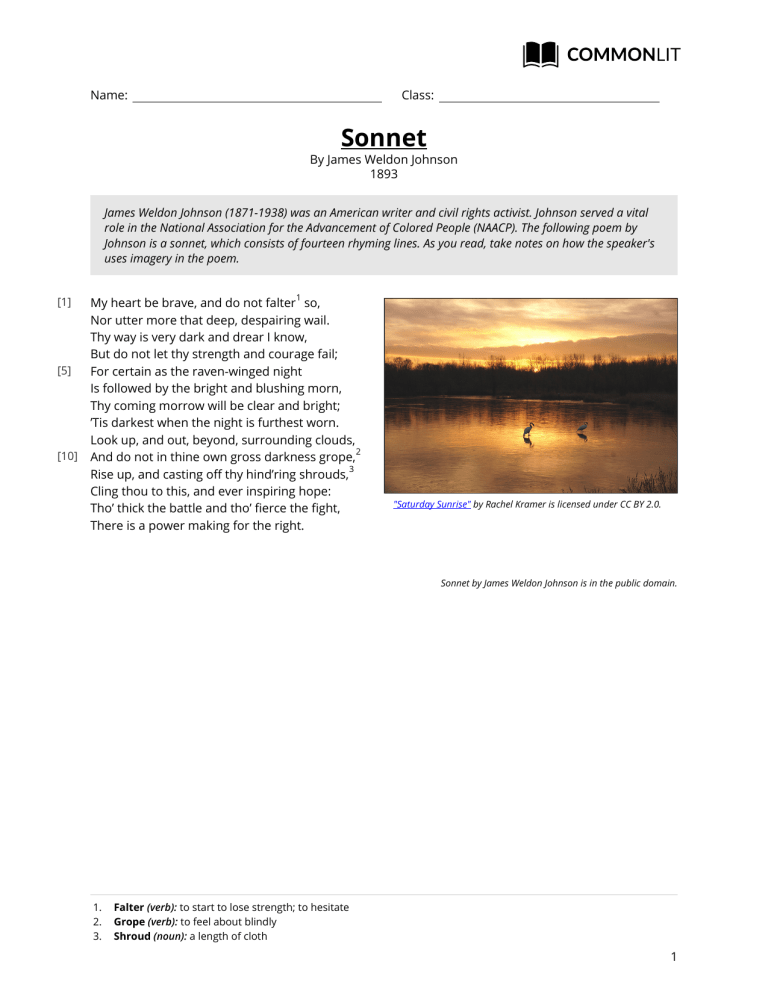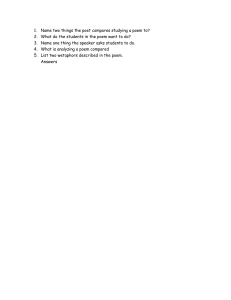
Name: Class: Sonnet By James Weldon Johnson 1893 James Weldon Johnson (1871-1938) was an American writer and civil rights activist. Johnson served a vital role in the National Association for the Advancement of Colored People (NAACP). The following poem by Johnson is a sonnet, which consists of fourteen rhyming lines. As you read, take notes on how the speaker's uses imagery in the poem. [1] [5] [10] 1 My heart be brave, and do not falter so, Nor utter more that deep, despairing wail. Thy way is very dark and drear I know, But do not let thy strength and courage fail; For certain as the raven-winged night Is followed by the bright and blushing morn, Thy coming morrow will be clear and bright; ’Tis darkest when the night is furthest worn. Look up, and out, beyond, surrounding clouds, 2 And do not in thine own gross darkness grope, 3 Rise up, and casting off thy hind’ring shrouds, Cling thou to this, and ever inspiring hope: Tho’ thick the battle and tho’ fierce the fight, There is a power making for the right. "Saturday Sunrise" by Rachel Kramer is licensed under CC BY 2.0. Sonnet by James Weldon Johnson is in the public domain. 1. 2. 3. Falter (verb): to start to lose strength; to hesitate Grope (verb): to feel about blindly Shroud (noun): a length of cloth 1 Text-Dependent Questions Directions: For the following questions, choose the best answer or respond in complete sentences. 1. PART A: Which of the following best describes a theme of the poem? A. B. C. D. 2. B. C. D. 3. B. C. D. [RL.1] “My heart be brave, and do not falter so, / Nor utter more that deep, despairing wail.” (Lines 1-2) “Look up, and out, beyond, surrounding clouds, / And do not in thine own gross darkness grope” (Lines 9-10) “Rise up, and casting off thy hind’ring shrouds” (Line 11) “Tho’ thick the battle and tho’ fierce the fight, / There is a power making for the right.” (Lines 13-14) How does the word choice in the poem contribute to its tone? A. 4. Tragedy and adversity builds character by testing people’s patience. Resiliency and hope will help people get through even the toughest of times. The experience of fighting and war should teach everyone the importance of peace. Life should be spent celebrating rather than mourning, because adversity is temporary. PART B: Which of the following quotes best supports the answer to Part A? A. [RL.2] [RL.4] The poem uses phrases such as “bright and blushing morn,” suggesting that the speaker is excited for what will happen in the future, contributing to a gleeful tone. The poem uses words such as “despairing” and “drear,” revealing that the speaker is upset about the current situation, conveying a pessimistic tone. The poem uses phrases such as “my heart,” implying that the speaker is addressing a loved one, contributing to a affectionate tone. The poem uses phrases such as “rise up” and “fierce the fight,” suggesting the speaker feels inspired to act, contributing to an impassioned tone. How does the poem's use of imagery develop the theme of the poem? Cite evidence from the text in your answer. [RL.4] It uses imagery by developing the theme by saying look up,cling,and coming. 2 5. How does the structure of the poem contribute to its meaning? Cite evidence from the text in your answer. [RL.5] The image in the passage shows the dreary night and also shows despairing wail. 3 Discussion Questions Directions: Brainstorm your answers to the following questions in the space provided. Be prepared to share your original ideas in a class discussion. 1. Why do you think the speaker cautions the reader not to “grope” in their own “darkness”? What does this mean? The speaker means by saying don´t doubt in your failures. 2. In the context of this poem, how does a person overcome adversity? Cite evidence from this text, your own experience, and other literature, art, or history in your answer. The person overcomes this adversity by believing in himself and thinking about other things. 3. In the context of this poem, what does it mean to be brave? Cite evidence from this text, your own experience, and other literature, art, or history in your answer. Being brave means by standing up to whats right. My heart to brave and not falter. 4



